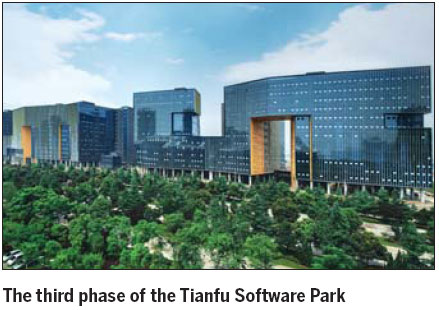

Can China continue to be a global powerhouse of economic growth?
To answer the question, one must examine the country and its cities inside and out.
A good starting point is Chengdu, the host city for the Fortune Global Forum 2013. Located in the western part of the country, Chengdu used to be a traditional business hub rooted in vast paddy fields nourished by water from Dujiangyan, one of the world's oldest and largest known irrigation systems.
The ingenious waterworks were built around 256BC, 35 years before China's first emperor unified the country. It was a symbol of China's advancement, signifying the early ripening of agricultural civilization.
The abundance of agricultural products available in Chengdu's surrounding Sichuan province earned it the name "Tianfu Zhiguo", meaning "consumers' paradise".
Though the heyday of local agriculture may have passed and the city is more than 1,000 kilometers from a seaport in any direction, Chengdu is not on the sidelines in the era of globalization.
Just as Chengdu's 2,500 year-old water works are still in use today, the city, with a population of more than 10 million, has become an increasingly important modern business hub in China's interior.
Last year, the city registered more than 813.89 billion yuan ($130.7 billion) in GDP, almost equivalent to half of the city of Beijing, or 40 percent of Shanghai.
Much change has come to Sichuan province. A driver of growth in China's reform era, its economy grew from 18 billion yuan in 1978 to more than 100 billion yuan in 1991, 500 billion yuan in 2003, and 1 trillion yuan in 2007.
Despite a devastating earthquake in 2008, the province's GDP exceeded 2 trillion yuan in 2011 and expanded further to 2.38 trillion yuan in 2012. It has a plan to raise its GDP to 3 trillion yuan in 2015. A record of development like this is a marvel even at a time when the whole country has been leading the world in economic growth.
Chengdu generates almost 35 percent of Sichuan's economy.But now that the urbanization ratio hovers around only some 40 percent in Chengdu's surrounding areas, the city can still contribute a lot to the country's future changes by absorbing more people into its urban environment and providing services to nearby areas.
Progress has been remarkable so far.
As an example of the city's modernization and open economy, city officials like to cite the increasing presence of international corporations in the city, especially inside the newly developed Chengdu Hi-Tech Zone.
Distance can no longer isolate the city from the rest of the world. It now has direct flights to such international destinations as Amsterdam, Bangalore and Vancouver as well as regular cargo trains to Europe.
These connections with the world are being operated by a new generation of English-speaking managers. There were 310,000 new workers with college credential in Sichuan in 2012.
While across the country, there will be almost 7 million in 2013, which is more than enough to fill in the vacancies in whatever new industries emerge.
Domestically, Chengdu is a logistics center for China's southwestern provinces.
It also houses a huge variety of agricultural and mining products. Building industrial strength is one of the easiest among all of Chengdu's developmental tasks.
Continuing to build houses and all public infrastructures is also relatively easy. There are standard ways to raise capital and implement plans.
But neither industry nor public infrastructure can be put to a good use unless the local people are willing to spend more money on new products and services.
The entire nation faces the same challenge. Domestic consumption is increasingly becoming the primary driver of sustained growth. Growth in global demand for Chinese products has been sluggish since the outbreak of the financial crisis in 2008, and recovery has been slow.
Meanwhile, China's wages have been on the rise together with yuan's exchange rate against other major currencies in the world.
Over the past couple of years, the government has designed many incentives for consumers to spend more, including short-term subsidies and more-extensive social security networks.
But there is one thing that officials cannot design - a cultural mix that rewards private entrepreneurship and equally creative consumer pursuits. This is where Chengdu can set an example for the whole China.
The city and Sichuan province are known in China to have a tradition that stresses a balance between work and leisure.
Chengdu's people strive for productivity while retaining a love for nature, and on a more philosophical level, they seek to find a middle ground between goal-oriented Confucianism and the spirituality of Buddhism and Taoism.
This tradition is still vividly alive in Chengdu - just like its folksy teahouses that coexist with high-tech factories and glass office towers.
With proper planning and sustainable development, Chengdu is on the right track to once again becoming a "consumers' paradise" as it was in the old days.
Contact the writer at edzhang@chinadaily.com.cn
 3D printing gallery opens in Chongqing
3D printing gallery opens in Chongqing
 Oil tank blasts cause casualties in N.E. China
Oil tank blasts cause casualties in N.E. China
 China's 1st Boeing 787 arrives Guangzhou
China's 1st Boeing 787 arrives Guangzhou
 Model catches eyes at C. China auto show
Model catches eyes at C. China auto show
 Models strut their stuff at Auto Shanghai auto show 2013
Models strut their stuff at Auto Shanghai auto show 2013
 New ways to sell a house?
New ways to sell a house?
 Hot girls on Auto Shanghai 2013 auto show
Hot girls on Auto Shanghai 2013 auto show
 Mazda girl at 2013 Auto Shanghai auto show
Mazda girl at 2013 Auto Shanghai auto show